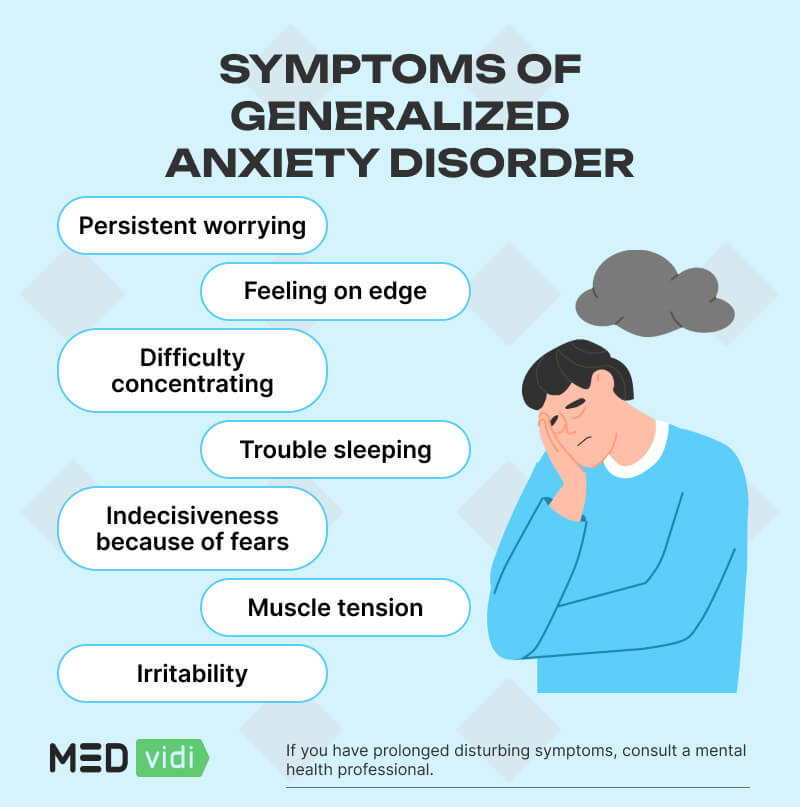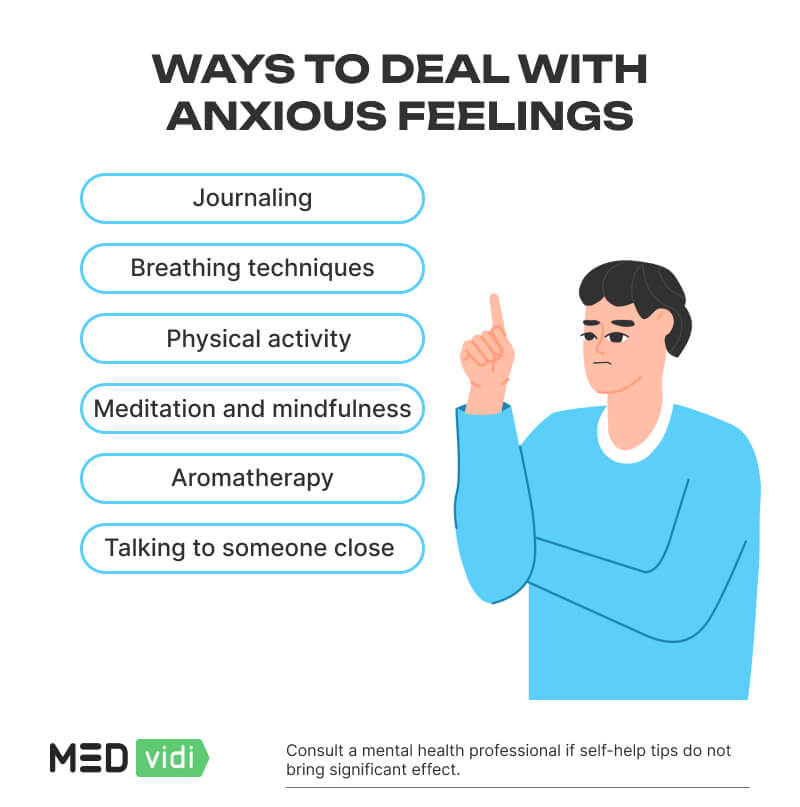Anxiety may feel overpowering and have an effect on many areas of your life. Fortunately, some treatments can help control anxiety symptoms and enhance general well-being. For example, Wellbutrin (bupropion) is one such choice.
Originally intended to treat major depressive disorder, Wellbutrin has also demonstrated good benefits when used to treat anxiety disorders. Its mode of action makes it an effective substitute for managing anxiety. Wellbutrin aids in mood regulation and reduces anxiety symptoms by focusing on particular neurotransmitters in the brain.
We will review the effects of Wellbutrin on anxiety in this comprehensive guide. Below, you will have the information you need to have an informed conversation with your healthcare provider.
Take the first step towards an anxiety-free life: book an appointment.
How Does Wellbutrin Work?
The exact mechanism of action of Wellbutrin is not fully understood. Still, it is believed to work by
Unlike many other antidepressant medications, Wellbutrin does not typically affect serotonin levels, which is why it is often chosen as a treatment option for individuals who cannot tolerate or do not respond well to selective serotonin reuptake inhibitors (SSRIs).
What is the Link Between Wellbutrin and Anxiety?
There are different ways in which medications might impact a person. Wellbutrin has, therefore, occasionally been connected to anxiety. However, even though it can make some people anxious, it is a
Can Wellbutrin Be Used for Treating Anxiety?
Wellbutrin is an antidepressant medication primarily used to treat depression. Still, it can also be prescribed for seasonal affective disorder (SAD) and as an aid for smoking cessation. So, is Bupropion good for anxiety?
There are some pieces of evidence on the effectiveness of Wellbutrin (bupropion) for anxiety. One older pilot
Can Wellbutrin Cause Anxiety?
Some people may experience anxiety symptoms soon after starting Wellbutrin, such as feeling restless, excitement, agitation, and shaking. According to the
It’s possible that these adverse effects may be the result of Wellbutrin dosage being high or increased too soon. After starting Wellbutrin, if you start to have jitters or symptoms of anxiety, talk to your doctor.

What Are the Benefits of Wellbutrin?
Even while Wellbutrin (bupropion) is more commonly used to treat conditions like depression than anxiety disorders, some people who take it for anxiety disorders may get relief from their symptoms. The following are some possible advantages of Wellbutrin for anxiety:
- Adjunctive effect. Wellbutrin is typically given as an antidepressant, while it may also be used in conjunction with other anti-anxiety drugs to treat symptoms of depression and anxiety. It may indirectly reduce some anxiety symptoms linked to depressive moods by successfully treating depression.
- Dopaminergic effects. Increased dopamine levels in the brain from taking Wellbutrin can help with motivation, focus, and pleasure. Individuals may reduce anxiety symptoms associated with low motivation, lack of interest, or difficulties concentrating by improving these factors.
- Minimal sedation. Compared to certain
other antidepressants[5] , Wellbutrin may have a less sedative impact. This may be advantageous for anxiety sufferers because excessive sedation might worsen the tiredness or foggy thinking that are frequent symptoms of anxiety. - Lack of significant weight gain. As a side effect of some drugs, some people with anxiety disorders may gain weight. Wellbutrin is often weight-neutral, unlike some other antidepressants, which may be helpful for people who are worried about weight gain.
It’s important to note that individual responses to medication can vary, and the effectiveness of Wellbutrin for anxiety symptoms may differ from person to person.
Connect with health experts online to get the right direction towards your anxiety treatment.
Side Effects of Wellbutrin
While Wellbutrin is generally well-tolerated by most people, like any medication, it can cause side effects in some people. Common side effects of Wellbutrin include:
- Nausea
- Insomnia
- Dry mouth
- Headache
- Agitation or restlessness
- Increases heart rate
- Tremors
How to Avoid Side Effects of Wellbutrin?
Here are some tips that may assist you in reducing potential adverse effects if you are currently taking Wellbutrin (bupropion) or are thinking about starting anxiety medications:
- Always take Wellbutrin as prescribed and follow the recommended dosage. Your doctor may suggest starting with a lower dose and gradually increasing it to help your body adjust and reduce the risk of side effects.
- Taking Wellbutrin with food can help alleviate gastrointestinal side effects, such as nausea or upset stomach.
- Drinking plenty of water throughout the day can help minimize the risk of dehydration, which is associated with certain side effects like dry mouth and constipation.
- If you experience mild insomnia when taking Wellbutrin, it may be helpful to take your dose earlier in the day to minimize any potential sleep disturbances.
- Avoid alcohol and illicit drugs. Wellbutrin and alcohol can interact, potentially increasing the risk of seizures and other adverse effects.
If you experience any bothersome or persistent side effects while taking Wellbutrin, it is important to inform your healthcare provider promptly.
5 Myths About Wellbutrin
There are a few myths and misconceptions about Wellbutrin (bupropion) that are important to clarify.
Myth #1: Wellbutrin is a sedative.
Fact: On the contrary, Wellbutrin is known for having an activating or
Myth #2: Wellbutrin is only used to treat depression.
Fact: Medical practitioners commonly prescribe Wellbutrin for depression, but it is also approved for the treatment of seasonal affective disorder (SAD) and as part of a smoking cessation program. In some cases, it may be prescribed off-label for other conditions such as attention deficit hyperactivity disorder (ADHD) or anxiety disorders.
Myth #3: Wellbutrin is addictive.
Fact: Wellbutrin is not considered addictive. It is not classified as a controlled substance, unlike some other medications used to treat mental health conditions.
Myth #4: Wellbutrin causes significant weight loss.
Fact: While weight loss can occur as a side effect of Wellbutrin in some individuals, it is not a guaranteed effect.
Myth #5: Wellbutrin increases the risk of seizures for everyone.
Fact: Seizures are a potential side effect of Wellbutrin, but they occur relatively rarely. The risk of seizures is higher at higher doses (above 450 mg per day), and individuals with certain medical conditions, such as a history of seizures or eating disorders, may be more susceptible.
Who Should Use Wellbutrin to Treat Anxiety?
Only a healthcare provider can determine if Wellbutrin is suitable for someone. However, there may be certain situations where a healthcare professional might consider prescribing Wellbutrin for anxiety. For example:
- Comorbid depression and anxiety. If an individual is experiencing both depression and anxiety symptoms at a time, Wellbutrin may be prescribed to address both conditions simultaneously.
- Coexisting nicotine dependence. Wellbutrin’s capacity to lessen nicotine cravings makes it a suitable smoking cessation treatment. Taking Wellbutrin might be a possibility if a smoker who suffers from anxiety also wants to stop smoking.
- Previous positive response. For individuals who have previously experienced success with Wellbutrin for anxiety symptoms, a healthcare professional may consider using it again.
- Individual factors. Healthcare professionals always consider an individual’s specific circumstances, medical history, and other factors when determining whether Wellbutrin is an appropriate treatment option.

When Should Wellbutrin Not Be Used for Treating Anxiety?
In the following circumstances, Wellbutrin (bupropion) might not be the best option for treating anxiety:
- A history of seizures. Wellbutrin has a lower seizure threshold, which increases the risk of seizures. So, it is contraindicated in people with a history of seizures. Also, people with conditions that increase the risk of seizures, such as severe head injury, stroke, or brain tumor are advised not to use bupropion.
- Eating disorders. Wellbutin is associated with an increased risk of seizure activity in people with eating disorders. Hence, due to the possibility of aggravating seizures, it is generally contraindicated in people with a history of eating disorders, such as anorexia nervosa or bulimia nervosa, either currently or in the past.
- Bipolar disorder or mania. Due to the possibility of inducing manic episodes or exacerbating pre-existing manic symptoms, Wellbutrin should be used with caution in people with bipolar illness. It could occasionally be required to combine Wellbutrin with a mood stabilizer.
- Allergy or sensitivity to bupropion. It is recommended to avoid bupropion or any of its components if you are allergic or hypersensitive to them.
Make an appointment right away to talk about anxiety medications that are suited to your requirements.
Alternative Treatments for Anxiety
In addition to pharmacological treatment, psychotherapy, and lifestyle changes can be used to improve the symptoms of anxiety. Here are several options:
- Cognitive behavioral therapy (CBT). CBT is a well-known psychotherapeutic strategy that focuses on recognizing and altering unfavorable thought patterns and behaviors that can fuel anxious feelings. It can aid people in acquiring coping mechanisms and anxiety management techniques.
- Dialectical behavior therapy (DBT). Another type of therapy that incorporates aspects of CBT and mindfulness exercises is DBT. It can help with anxiety management and is frequently used to treat problems like borderline personality disorder.
- Exercise and physical activity. It has been demonstrated that regular physical activity and exercise are beneficial for mental health, especially anxiety. Exercise enhances sleep, lowers stress, and increases general well-being by encouraging the release of endorphins.
- Relaxation techniques. Progressive muscle relaxation, guided imagery, mindfulness meditation, and deep breathing techniques can all assist to calm the mind and lessen the symptoms of anxiety. These methods can be learned from self-help books, applications, or by consulting a therapist.
- Herbal supplements. A number of herbal products, including chamomile, kava, and passionflower, have been demonstrated to have soothing effects and are occasionally used as complementary treatments for anxiety.
- Acupuncture. Acupuncture is a traditional Chinese medical procedure that includes putting tiny needles into certain body areas. Some people discover that acupuncture treatments might aid in promoting calm and reducing anxiety.
Before thinking about any alternative treatments, it’s essential to speak with a healthcare provider to make sure they are appropriate for your unique circumstances.
When to Talk to Your Doctor?
It is crucial to speak with your healthcare provider if you are dealing with severe anxiety symptoms, physical health concerns related to anxiety, difficulties functioning in daily life, or worries about your safety. To get an accurate diagnosis and suitable treatment, including prescription medication, you should seek professional assistance.
Frequently Asked Questions
Does bupropion make anxiety better or worse?
Although it is frequently recommended for depression, bupropion (Wellbutrin) can also be used to treat anxiety disorders. Bupropion’s impact on anxiety can differ from person to person. While some people may find that bupropion reduces their anxiety symptoms, others may discover that a side effect of the medication is an increase in anxiety. To decide on the best course of action, it is crucial to let your doctor know if your anxiety symptoms alter.
How much Wellbutrin can you take for anxiety?
Depending on a person’s unique circumstances, including medical history, response to the medicine, and other medications being used, the recommended dosage of Wellbutrin for anxiety can change. The ideal dosage for your unique circumstances can only be determined by a medical practitioner.
How long does it take Wellbutrin to work for anxiety?
Wellbutrin’s time to act in treating anxiety can vary. While some people may start noticing a difference in their anxiety symptoms within a few weeks, it can take longer for others. It’s crucial to show patience and have regular follow-ups with your doctor to track the medication’s efficacy.
What type of anxiety does Wellbutrin treat?
Generalized anxiety disorder (GAD) and social anxiety disorder (SAD) can both be treated with Wellbutrin. There is some
Is Wellbutrin better than Zoloft for anxiety?
The best person to compare Wellbutrin to Zoloft (sertraline) for anxiety in your particular case is a healthcare provider who can evaluate your needs. Wellbutrin is an atypical antidepressant, whereas Zoloft is an SSRI, which means these drugs fall into separate categories. The decision between them will rely on a number of variables, including medical history, individual reaction, and probable side effects. They both operate differently in the brain.
What does Wellbutrin-related anxiety feel like?
Different people feel anxiety as a side effect of taking Wellbutrin differently. Some people might not feel any worry at all, while others might feel more agitated, anxious, or restless.
How long does anxiety from bupropion last?
Bupropion-induced anxiety can range in length of time. As your body becomes used to the drug, the symptoms may in some cases go away on their own in a few weeks. However, it’s imperative to see your doctor for a complete examination and recommendations if anxiety symptoms intensify or persist.













